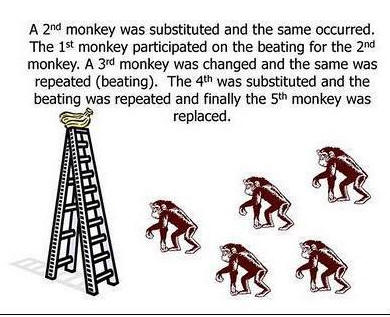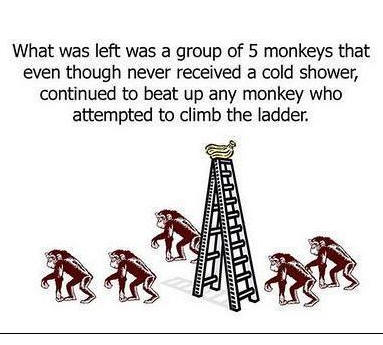
The articles on this website may be reproduced freely as long as the following source reference is provided: Joseph A Islam www.quransmessage.com

Salamun Alaikum (Peace be upon you)
FOLLOWING TRADITIONS BLINDLY - TRAINED MONKEYS EXPERIMENT
![]()
Copyright © 2009 Joseph A Islam: Article last modified 8th February 2012
A POWERFUL METAPHOR DEPICTING A VERY REAL CONDITION
Source: See REFERENCE [1]
Original Copyrights unknown
Image in the public domain: See REFERENCES [2], [3], [4]
The illustration above [1] seems to suggest provenance from actual scientific experiments, though admittedly this cannot be confirmed in this article. Scholarly sources for a possible experiment with different experimental data have been cited below for the reader's perusal. [5] & [6]
Irrespective of its source depicted in terms of monkeys, the illustration certainly captures an observable human condition.
"Social mediation of sign acquisition is also implicated in the observed social distributions of particular behaviour patterns among individuals in feral populations of certain primate species. In this regards, Joslin, Fletcher, and Emlen's laboratory study (1965) found that rhesus monkeys reared in the wild would not reach toward a live snake or snakelike model to retrieve a food reward. Laboratory-reared rhesus, in the same test situation, showed little hesitancy in reaching for the reward. In explanation, Joslin et al. proposed that, in the wild, young rhesus monkeys learn to fear snakes by observing the reactions of older members of their social group to snakes; laboratory-reared monkeys, never exposed to snakes or to adult reactions towards snakes, do not acquire the response. Menzel (1966) observed Japanese macaque mothers pull their infants away from novel objects which he had places along frequented trails. On two occasions, K. Norikoshi (personal communication) has observed a Japanese macaque mother of the Arashiyama troop pull an infant away from a nearby snake.
These interactions are similar to those which I observed during my study of the acquisition of a specific learned response among rhesus monkeys. In one case, just as the naive member reached for its partners' conditioning object, the conditioned member came up behind the naive, grabbed it by the hind legs, and pulled it away from the object. I regard this type of social interaction as admonition (E. T. Hall 1959). In my study, however, some conditional animals began to manipulate their conditioning object after they had observed the naive member manipulating that object without punishment. Among Japanese macaques, foods previously ignored or avoided by socially interacting members of a troop have on occasion eventually become accepted as foods and were eaten by some members. After an initial acceptance of caramels by some infants and young of the Takasakiyama troop, Itani (1958) observed a caramel eating food habit slowly propagate through most of the rest of the troop" [5]
[5] CARPENTER. C.R, Behavioral Regulators of Behavior in Primates, Associated University Press, Inc, (c) 1973, Section 2, Page 37-38, Article by: STEPHENSON. G R, Biology of Communication and Population Structure, An Operational View of Acquired Communicative Behavior, Socially Mediated Sign Learning.
"Menzel (1966, p. 134) has also described a particularly intriguing observation of apparent intentional transmission of avoidance behavior in free-living Japanese macaques (see also Menzel, 1973, p. 200). On "more than six occasions," adult females were observed to pull their offspring away from a novel object that the females themselves were avoiding. No mention is made of the long-term effects of this interaction on the behavior of the young. However, in a laboratory analog, Stephenson (1967) trained adult male and female rhesus monkeys to avoid manipulating an object and then placed individual naive animals in a cage with a trained individual of the same age and sex and the object in question. In one case, a trained male actually pulled his naive partner away from the previously punished manipulandum during their period of interaction, whereas the other two trained males exhibited what were described as "threat facial expressions while in a fear posture" when a naive animal approached the manipulandum. When placed alone in the cage with the novel object, naive males that had been paired with trained males showed greatly reduced manipulation of the training object in comparison with controls. Unfortunately, training and testing were not carried out using a discrimination procedure so the nature of the transmitted information cannot be determined, but the data are of considerable interest" [6]
[6] GALEF JR, B.G, Social Transmission of Acquired Behavior: A Discussion of Tradition and Social Learning in Vertebrates, C. Predator Avoidance, Department of Psychology McMaster University, Hamilton, Ontario, Canada, Reprinted from: Advances in the Study of Behavior, Vol 3, (c) 1976, Academic Press, inc, Pages 87-88, Available at [online] http://www.sociallearning.info/home/pdf/social%20transmission%20of%20aquired%20behavior.pdf [Accessed] 8th February 2012







